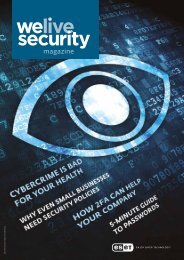magazine
Create successful ePaper yourself
Turn your PDF publications into a flip-book with our unique Google optimized e-Paper software.
OPINION<br />
IT security<br />
software isn’t a<br />
program in your<br />
hard drive – it’s a<br />
communication<br />
system. Done<br />
right, it works<br />
like an immune<br />
system, but a<br />
global one.<br />
show Red Dwarf, was written by this<br />
English chap Christopher Pile. It stood<br />
for Simulated Metamorphic Encryption<br />
Generation. When it wiped your hard<br />
drive, it said, “Smoke me a kipper, I’ll be<br />
back for breakfast… but your data won’t.”<br />
The media had been guilty of<br />
presenting malware as largely Eastern<br />
European in origin, and Pile wanted<br />
to prove them wrong. With the<br />
commercialization of malware, that’s all<br />
gone. They don’t care about the quality<br />
– just the money. I saw it first with<br />
attacks targeting AOL users. They were<br />
stealthy – just stole password details<br />
and credit cards.<br />
There wasn’t any attempt to be clever.<br />
There were enough people<br />
who didn’t update Windows that<br />
it would spread anyway. Now, it’s<br />
more than that. It’s “let’s write computer<br />
programs to write more malware for us”.<br />
Spotted by computer<br />
But now, most of what we see is<br />
not entirely new and unique, it’s<br />
based on malware we’ve seen before.<br />
Each new variant has been written<br />
by a computer – and is usually spotted<br />
by a computer.<br />
Even if you have 100 researchers,<br />
you can’t keep up with the volume<br />
of detections. Expert systems do the<br />
detection – customers want protection<br />
very, very quickly, and humans can’t<br />
provide that level of speed and<br />
accuracy. Expert systems can.<br />
An expert system can, for instance,<br />
look inside a piece of code, and make a<br />
guess about whether it’s a banking Trojan<br />
very quickly. They’ll scan for banking<br />
URLs – or related ones. They’ll look for<br />
other markers – is there any Portuguese?<br />
A lot of today’s banking Trojans come<br />
from Brazil – and the code’s compiled<br />
with Delphi. So the system will look<br />
for a Delphi copyright message – but<br />
of course, the cybercriminal knows it<br />
will, so he’ll write that it was done in<br />
Microsoft C. A clever expert system will<br />
look at that and know that here we have<br />
a piece of code that’s in Portuguese, is<br />
pretending to have been compiled in C –<br />
hiding its origin – and has banking URLs<br />
in it. Even if you’ve never seen it before,<br />
you’ve already got a good idea it’s bad.<br />
That’s a very simplified take, of course,<br />
but this proactive defense is the future.<br />
Not in labs, but in home PCs. You have<br />
to look at the behavior of malware in<br />
real time, and when you think, “This<br />
is suspicious”, either turn it off, alert<br />
the user, or report back to base. Your<br />
PC has to be part of a bigger system.<br />
IT security software isn’t a program<br />
on your hard drive – it’s actually a<br />
communication system. Done right,<br />
it works like an immune system,<br />
but a global one. Sending information<br />
isn’t always something we like to<br />
do. Those windows asking you to share<br />
information are needed more than ever.<br />
“We’re all on the Internet, which<br />
means we’re all part of the same<br />
family. It’s up to all of us to defend it.”<br />
LANDMARKS IN MALWARE<br />
Floppy disk<br />
Red Dwarf<br />
Chernobyl<br />
Cryptolocker<br />
Windigo<br />
1990 2014<br />
Red Dwarf © www.reddwarf.co.uk<br />
welivesecurity.com 21



